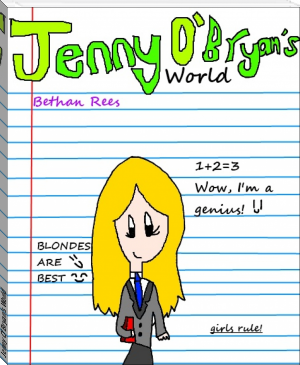The History and Records of the Elephant Club by Doesticks and Underhill (android based ebook reader TXT) 📗

- Author: Doesticks and Underhill
Book online «The History and Records of the Elephant Club by Doesticks and Underhill (android based ebook reader TXT) 📗». Author Doesticks and Underhill
When the curtain went down Hamlet was too exhausted to get up, and instantly everybody rushed to the rescue; those he had slaughtered but a few minutes before, forgot their mortal wounds, and hastened to the murderer with something to drink. The King rushed up with a pewter mug of beer; Horatio presented the brandy-bottle; the Ghost handed him a glass of gin and sugar; the Queen[Pg 301] gave him the little end of a Bologna sausage and a piece of cheese; the stage carpenter, in his bewilderment, could think of nothing but the glue-pot; the property man hastened to his aid with a tin cup full of rose-pink, and a plate-full of property apple-dumplings (ingeniously but deceptively constructed out of canvas and bran), while an insane scene-shifter first deluged him with water, and then offered him the bucket to dry himself with.
John Spout, who had been behind the curtain, and witnessed this last performance, immediately came out, borrowed Wagstaff's notebook, and left therein his pictorial reminiscence of this scene as follows:
Overdale had been profuse in his explanations of[Pg 302] the many curious scenes, and Wagstaff had noted down his words carefully in his memorandum-book. Once when the Ghost tripped and fell through the scenery, caving in the side of a brick house, and kicking his spiritual heels through the belfry of a church in the background, Overdale said that this was Ophelia, who had been taken suddenly crazy, and in her frenzy had imagined it necessary to hasten to the nearest grocery for a bar of soap to saw her leg off with. Polonius, he explained, was Horatio, and Hamlet was a little boy who run on errands for the cook of the palace, by which culinary appellation he designated the Queen of Denmark. He said the plot of the piece was, that the king wanted to marry the cook, but her relatives objected to the alliance, because his majesty hadn't got shirts enough for a change.
All of which was carefully written down by Wagstaff, with divers alterations, emendations, additions, and extemporaneous illustrations, by John Spout.
This last-named individual asserts to the present time that he cannot tell who were the most humbugged—the people who paid their money, and laughed at the play under the impression that it was a farce, or the unfortunates who performed the play,[Pg 303] laboring under the hallucination that they were acting tragedy.
All were, however, satisfied, that it was a kink of the Elephant's tail, which he has not yet uncurled in any city of America—save Gotham.
[Pg 304]
"Black spirits and white,
Red spirits and grey,
Mingle, mingle"——
MR. Remington Dropper had a great respect for upper tendom; was almost inclined to admit, without question, its claims to the worship of the vulgar masses, and confessed that when he saw one whom he took to be a leader of fashion coming, he felt an involuntary movement of his right hand towards his hat. He admitted that he had, by this manner of doing indiscriminate homage to well-dressed people, on several occasions taken off[Pg 305] his hat to notorious horse-jockeys, faro-dealers, and gamblers.
"However," said John Spout, "if you want to go to a grand fancy dress ball, where you will meet all 'the world,' as these try-to-be-fashionable people call those who have scraped together dollars enough to entitle them to their royal notice, I can very easily get you an invitation. Mrs. Throughby Daylight, whose husband made a fortune by selling patent medicine, and thereby purged himself of poverty and plebeianism together, gives, in a short time, a grand fantasquerade, which is intended to be the most consolidated fancy dress jam of the season. Do you want to go?"
"Go," replied Dropper, "how can I go? I don't know Mrs. Throughby Daylight, or Mr. Throughby Daylight, or any of the Daylights, so that Daylight is all moonshine."
"Dropper," was the response, "you're young; I excuse that, for you can't help it; but you're also green, which I cannot forgive; your verdancy is particularly noticeable when you revive the absolute absurdity of supposing that it is necessary to be acquainted with a lady before you are invited to attend her parties. That antiquated idea has been long since exploded. Why, my dear sir, it is no[Pg 306] more necessary that you should have ever previously heard of a woman whose 'jam' you receive an invitation to attend, than it is probable she knows who you are, or where the devil you come from."
Dropper was bewildered.
"It is a positive fact," continued Spout. "Why, bless your innocent eyes, a woman of fashion no more knows the names of the individuals who attend her grand party, than she knows who took tea last night with the man in the moon. She merely orders music and provisions, makes out a list of a few persons she must have, has her rooms actually measured, allows eight inches square to a guest; thus having estimated the number that can crowd into her house, she multiplies it by two, which gives the amount of invitations to be issued, after which she leaves the rest to Brown. Brown takes the list; Brown finds the required number of guests. Brown invites whom he pleases; Brown fills the house with people, and Brown, and only Brown, knows who they are, where they came from, or how the deuce they got their invitations."
Dropper, still more bewildered, inquired who Brown was.
"Brown," explained John Spout, "is the Magnus Apollo of fashionable society—he is the sexton of[Pg 307] Graceless Chapel, and no one can be decently married, or fashionably buried without his assistance. He has a wedding face and a funeral face, but never forgets himself and cries over the bride or laughs at the mourners; he is great as a sexton, but it is only in his character of master of ceremonies at a party, that he rises into positive sublimity—he is the consoler of aspiring unfashionables, who have got plenty of money, and want to cut a swell, but don't know how to begin. He is the furnisher of raw material on short notice, for fashionable parties of all dimensions; his genius is equal to any emergency, though, as the latest fashion is to invite three times as many people as can get into the house at any one time, Brown is often put to his trumps. Mrs. Codde Fishe last week wanted to give a party, and, of course, called on Brown. Brown measured the parlors; they would only hold 1728, even by putting the chairs down cellar, and turning the piano up endways. Mrs. Codde Fishe was in despair. Mrs. P. Nutt had received 1800 at her party the night before, and if she couldn't have 2000 she would be ruined. Brown's genius saved her. 'Mrs. F.,' said he, 'though we must invite 2000 people, and though we must have 2000 people in the house, they need not be all there at one time, and they need not all stay.'[Pg 308]
"'Certainly not,' said Mrs. Fishe.
"'I'll manage it,' said the indefatigable Brown—and Brown did manage it. He got 272 retail drygoods clerks, whom there didn't anybody know, dressed them in white gloves and the required fixens, so they looked almost as well as men. Well, sir, if you'll believe it, Brown had his 272 clerks arrive at the door, eleven at a time, in hired hackney-coaches, announced them, by high-flown names, to the hostess, had them march in single file through the parlors to the back door, where he had a man waiting to conduct them over the garden-fence by a step-ladder, and so get them out of the way to make room for more.
"Mrs. Lassiz Candee had but 1439 names on her list; she wanted 1800. Brown was summoned. Brown heard the trouble. Brown produced from his pocket a list of names twenty-one yards in length. For a moderate compensation he furnished Mrs. Candee with a yard and a half of literary celebrities, three yards of 'Shanghaes,' five yards and a quarter of polka dancers, and about fourteen feet of foreigners, with beards and moustaches for show-pieces, and to give the thing a 'researcha' look.
"But, not to be too tiresome, Dropper, I am on Brown's list of eligibles, and can get your name added also."[Pg 309]
Remington eagerly accepted the offer, and three days after they found on their table two huge envelopes, addressed respectively to "Mr. John Spout," and "Mr. Remington Dropper." Remington, trembling with haste, broke open his at once, and discovered a card about the size of a washboard, on which was a communication to the effect that Mrs. Throughby Daylight requested the pleasure of the company of Mr. Remington Dropper, and that it was to be a fancy dress party, and he was requested to appear in costume, all of which he only discovered by calling John Spout to his assistance, who condescendingly explained everything.
Remington was overjoyed, but in answer to all his anxious inquiries concerning the manner of procuring the invitation, he only elicited from John Spout the mysterious monosyllable, Brown!
"What does it mean by coming 'in costume?' How am I to dress? What shall I put on, and where shall I get it?" inquired he.
John explained. "It means that you are to disguise yourself in an un-Christian attire of some description, making yourself look as unlike a 'human gentleman' as possible—call yourself a 'Gondolier,' a 'Brigand,' a 'Minstrel Boy,' or some other sentimental or romantic name, and cut as big a splurge[Pg 310] in your borrowed clothes as possible. If you know anybody who belongs to the theatre, you can easily borrow a rig; if not, you'll have to hire it of a Jew, and give security that you'll bring it back."
For four days Mr. Dropper was in a state of feverish undecision respecting his choice of a character. At the end of that time he was still wavering between a "Turk," a "Monk," and "Jack Sheppard." By John Spout's suggestion he resolved to decide the matter by a throw of the dice, which method made a "Turk" of him for the eventful evening, the "Monk" getting deuce, ace, and a five, "Jack Sheppard" scoring but eleven, while his oriental highness came off victorious, by means of two fours and a six. John Spout was going as a Choctaw Indian, so that he could smoke all the time and no one would find fault and say that he was vulgar.
The wished-for evening arrived, and Remington began to dress at four in the afternoon, so as to be in time. By the assistance of two Irishmen and a black boy he got his dress on at half-past six; and at a quarter to seven he sunk exhausted into a arm-chair, and went to sleep.
John's own toilette was quickly made; he had borrowed his dress from a friend, who attended in person to put it on for him.[Pg 311]
When they were ready, the black boy was dispatched for a hack, into which they both got; after experiencing some difficulty from Spout's war club, which got tangled in Remington's trousers, and being a good deal exasperated by Dropper's scimitar which would get between John Spout's legs and interfere with his breech cloth.
At last they approximated the house, and their carriage took its place in the rear of a long line which had formed in front of Mrs. Throughby Daylight's mansion, and anxiously waited for those in front to move out of the way, and give them a chance to get out.
They could hear in the distance the shrill whistle and the voice of the indefatigable Brown, shouting "Room for Mrs. Rosewood's carriage;" "Clear the way for Mrs. Fizgiggle's vehicle;" "Let Mrs. Funk's establishment come up;" and then Brown would disappear into the house, and a faint echo of Brown would be heard from the inside, announcing these visitors as "Mrs. Noseblood," "Mrs. Buzfiggle," and "Mrs. Junk," it being a peculiarity of Brown, that although he might get the names of the guests right the first time, he never announced them at the door without some ludicrous perversion.
Our friends at length attained the entrance, and,





Comments (0)